This
opinion article was first
published on CLUAS in February 2005
CLUAS Opinion
Michael Jackson: demon or demonised? Or both?
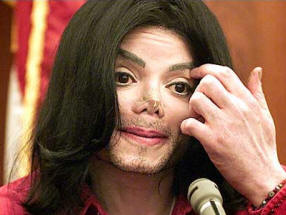 As
Michael Jackson's court case gets underway Aidan Curran reflects on the fact
that - whether he is found innocent or guilty - his fall from grace is a
personal tragedy on an enormous scale.
As
Michael Jackson's court case gets underway Aidan Curran reflects on the fact
that - whether he is found innocent or guilty - his fall from grace is a
personal tragedy on an enormous scale.
So the sorry case of Michael Jackson surfaces again in our news. At the time
of writing he stands accused of an appalling crime, one that our society rightly
regards as indefensible and sickening. Jackson is, of course, innocent until
proven guilty. However, short of inventing a cure for cancer, AIDS and the
common cold in one pill, nothing that he could do will ever redeem his
reputation now, even if he is found innocent.
It takes a great leap of the imagination to think of Jackson today as a
musician, an entertainer rather than an entertainment in himself. With miserable
irony, he who had such interest in the life and remains of John Merrick has now
become the Elephant Man of our age, a grotesque freakshow of never-ending
tabloid amusement and mock-horror. Bubbles, Neverland, Lisa-Marie Presley - the
whole saga has been chronicled by every greasy gossip mag and haughty Sunday
supplement.
Yet for those who were pre-teens in the early 1980s, Michael Jackson was at that
time the most exciting musical act on the planet. The singles from his first two
solo albums still sound fantastic. "Don't Stop 'Til You Get Enough' fizzes with
Saturday night electricity, and 'Billie Jean' is brilliant, full stop. Even his
duet with the archduke of Eighties crapness, Paul McCartney, on 'Say Say Say'
sounds not-bad and Jackson got the publishing rights to the entire Beatles back
catalogue in the bargain. You thought you were cool because you owned a few
Beatles records: in the 1980s Jackson owned The Beatles.
We wanted to dance like him; the moonwalk seemed like an awesome magic trick
that we could never figure out. We wanted to dress like him; short trouser legs
over white socks looked better on him than on us, however. As with all proper
pop stars, we wanted to be him.
Then in 1987 the world saw the cover of Jackson's long-awaited new record 'Bad',
and things were never the same again. The handsome and charming Jackson of
'Thriller' had hacked and chiselled his face into a harsh metallic scowl, a sick
parody of cosmetic surgery. And now Jackson was - unquestionably, unavoidably,
uncomfortably for some - a white man. The pioneer and champion of black music on
the fledgling MTV had literally changed face and now apparently believed that
skin colour mattered, in his mind at least. Explanations of dermatological
illness were believed by nobody. The subsequent single 'Black And White',
however well-intentioned it may have been on Jackson's part, was widely seen as
brazen hypocrisy on the part of someone who had, in the eyes of many,
capitulated to the unspoken race code of the entertainment industry.
The most famous person on the planet was publicly breaking down under the weight
of his own insecurities, and we couldn't get enough of it. We feasted on the
stories of his eccentricities and whims, we desserted on ridicule and childish
jokes, we picked our teeth with the debris of his dignity.
Then came the grave accusations of child molestation against Jackson, and the
jokes began to ring hollow. Jackson is charged with the abuse of impressionable
children - children who may once have wanted to be like him.
When he himself was a boy, Jackson was regarded as the new James Brown, and the
comparison illustrates the tragedy of Jackson's life. Brown too has made a show
of himself at times, with a litany of drug abuse, high-speed police chases and
various other misdemeanours culminating in a spell in prison. Yet anyone who has
seen Brown on stage recently has had the good fortune to witness a genuine
legend, an electrifying performer who works hard, loves his music, enjoys
playing intimate venues and seems relatively happy in life. Jackson, on the
other hand, seems set on personifying a humourless Christ-like figure of
redemption through public suffering as demonstrated in the sickening 'Earth
Song', so gloriously undermined by Jarvis Cocker's stage-crashing in London in
1995.
It's hard to imagine Michael Jackson ever playing a proper concert again, ever
singing 'Billie Jean' or moonwalking again, and it's the world's loss. Perhaps
only Las Vegas, home to overweight curiosities like his former father-in-law,
would have him now. If Jackson loves music even half as much as James Brown so
clearly still loves music, if he hasn't completely given himself over to the
sorry sewage of his last 20 years of musical output, if he has listened to
Justin Timberlake's fantastic singles and heard his own influence upon them,
then it must hurt him too. What does Michael Jackson think about in his quiet
moments?
It's insignificant in comparison to the suffering he allegedly inflicted on
others, but even if found innocent Jackson is already serving a life sentence.
In all likelihood, not even Michael Jackson would want to be Michael Jackson
now.
Aidan Curran
 Check out the discussion this article provoked on the
CLUAS
discussion board.
Check out the discussion this article provoked on the
CLUAS
discussion board.
Previous CLUAS Opinion pieces...
|
Buskers: Scourge or Saviours of our cities?
|
Dateline: January 2006 |
|
 I
hate buskers. Hate them, hate them, hate them. Can't stand them. Won't
put up with them. Acoustic-guitar shouter on Grafton Street blocking
me going into Bewleys? Get out of my way! Doddery old accordion fella
on the Paris metro? Go off and do something productive like starting
a riot! Half-naked cowboy guy in New York? Pull up your pants, you eejit!
Read the full article... I
hate buskers. Hate them, hate them, hate them. Can't stand them. Won't
put up with them. Acoustic-guitar shouter on Grafton Street blocking
me going into Bewleys? Get out of my way! Doddery old accordion fella
on the Paris metro? Go off and do something productive like starting
a riot! Half-naked cowboy guy in New York? Pull up your pants, you eejit!
Read the full article...
|
|
Have Arctic Monkeys gone and peaked too
early?
|
Dateline: December 2005 |
|
 The
majority of the music fed to the masses, sucks. It's watered down sufficiently
to appeal to as many people as possible, in order to offend as few as
possible, in order to shift as many units as possible, which is why
most entries into the charts are offensive. Dance is "cheesy" (or worse
still, "commercial", duh). Pop is dominated by boy bands, novelty songs,
runners up in reality TV shows and 2-dimensional 'stars?...
Read the full article... The
majority of the music fed to the masses, sucks. It's watered down sufficiently
to appeal to as many people as possible, in order to offend as few as
possible, in order to shift as many units as possible, which is why
most entries into the charts are offensive. Dance is "cheesy" (or worse
still, "commercial", duh). Pop is dominated by boy bands, novelty songs,
runners up in reality TV shows and 2-dimensional 'stars?...
Read the full article...
|
|
What Pop Music Can Teach Us About The
Spirit Of Christmas...
|
Dateline: December 2005 |
|
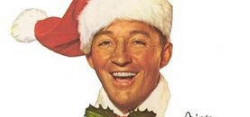 I
was driving home the other night to the missus, listening to Rufus Wainwright's
'Spotlight on Christmas', and it struck me that this simple song, originally
recorded for a MOJO Magazine Christmas themed CD, had more to say about
the core truths of Jesus Christ and Christmas than anything I've heard
from the Roman Catholic Church in quite some time.
Read the full
article... I
was driving home the other night to the missus, listening to Rufus Wainwright's
'Spotlight on Christmas', and it struck me that this simple song, originally
recorded for a MOJO Magazine Christmas themed CD, had more to say about
the core truths of Jesus Christ and Christmas than anything I've heard
from the Roman Catholic Church in quite some time.
Read the full
article...
|
|
Top Ten Acts on the Irish Indie Music
Scene of 2005
|
Dateline: December 2005 |
|
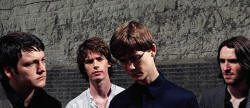 Alas,
another year has rolled by. It was a long period, when many a Euro had
been tossed towards the outstretched claws of music promoters and record
store employees. But, this is the time of the year that one should thank
them for stocking the music one wants, and for putting on the shows
that one desires to attend. It's also time highlight some of the unsigned
acts that have rapidly matured over the past twelve months. Of the many
who contested for one's attention, there were the following ten that
- for me at least - managed to stand out...
Read the full article... Alas,
another year has rolled by. It was a long period, when many a Euro had
been tossed towards the outstretched claws of music promoters and record
store employees. But, this is the time of the year that one should thank
them for stocking the music one wants, and for putting on the shows
that one desires to attend. It's also time highlight some of the unsigned
acts that have rapidly matured over the past twelve months. Of the many
who contested for one's attention, there were the following ten that
- for me at least - managed to stand out...
Read the full article...
|
|
Homosexuality in pop music and the taboos
that still surround it...
|
Dateline: September 2005 |
|
 Mark
Feehily from Westlife recently revealed - via tabloid, naturally - that
he was gay. Being neither gay nor a Westlife fan, I had no feelings
of solidarity, shock or anything about it. Initially I gave it as little
interest as I do to Brian McFadden's nauseating attempts to cling to
celebrity status by moaning about it as publicly as possible.
Read the full article... Mark
Feehily from Westlife recently revealed - via tabloid, naturally - that
he was gay. Being neither gay nor a Westlife fan, I had no feelings
of solidarity, shock or anything about it. Initially I gave it as little
interest as I do to Brian McFadden's nauseating attempts to cling to
celebrity status by moaning about it as publicly as possible.
Read the full article...
|
|
Ring tones and the music industry
|
Dateline: June 2005 |
|
 It
has run the full gamut of description: from the ultimate marketing coup
to the end of music as we know it, a ring tone has crossed over to top
the singles chart. This has prompted a collective scratching of heads,
much comment on the thirty million spent promoting it and general sympathy
for Coldplay, who lost out in the race for the top spot. But before
we all run out to buy Coldplay's next single to right this abhorrence,
should we really be surprised that the music industry is more comfortable
doing business without an artist?
Read the full article... It
has run the full gamut of description: from the ultimate marketing coup
to the end of music as we know it, a ring tone has crossed over to top
the singles chart. This has prompted a collective scratching of heads,
much comment on the thirty million spent promoting it and general sympathy
for Coldplay, who lost out in the race for the top spot. But before
we all run out to buy Coldplay's next single to right this abhorrence,
should we really be surprised that the music industry is more comfortable
doing business without an artist?
Read the full article...
|
|
The Top Ten Bloke Songs
|
Dateline: May 2005 |
|
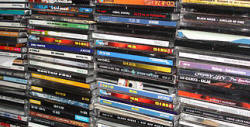 Here
they are. The ten songs every unreconstructed male should have close
to hand, preferably on a mix CD stashed in your sock drawer, to be played
only prior to emergencies (baby showers, distant relatives? funerals
and dinner with her friends).
Read the full article... Here
they are. The ten songs every unreconstructed male should have close
to hand, preferably on a mix CD stashed in your sock drawer, to be played
only prior to emergencies (baby showers, distant relatives? funerals
and dinner with her friends).
Read the full article...
|
|
The importance of the audience in a music
scene...
|
Dateline: March 2005 |
|
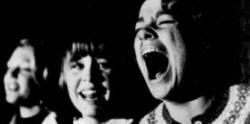 Some
say that rock music, at least rock music with the balls to look you
in the eye and force a sigh, is dead and gone. They claim that it died
on a couch with Sid Vicious, in a lonely hotel room with Janis, growing
cold in a bath with Jim Morrison or twitching on a puke-stained bed
with Bonzo Bonham.
Read the full article... Some
say that rock music, at least rock music with the balls to look you
in the eye and force a sigh, is dead and gone. They claim that it died
on a couch with Sid Vicious, in a lonely hotel room with Janis, growing
cold in a bath with Jim Morrison or twitching on a puke-stained bed
with Bonzo Bonham.
Read the full article...
|
|
Michael Jackson: demon or demonised?
Or both?
|
Dateline: February 2005 |
|
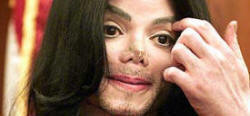 So
the sorry case of Michael Jackson surfaces again in our news. At the
time of writing he stands accused of an appalling crime, one that our
society rightly regards as indefensible and sickening. Jackson is, of
course, innocent until proven guilty. However, short of inventing a
cure for cancer, AIDS and the common cold in one pill, nothing that
he could do will ever redeem his reputation now, even if he is found
innocent. Read the full
article... So
the sorry case of Michael Jackson surfaces again in our news. At the
time of writing he stands accused of an appalling crime, one that our
society rightly regards as indefensible and sickening. Jackson is, of
course, innocent until proven guilty. However, short of inventing a
cure for cancer, AIDS and the common cold in one pill, nothing that
he could do will ever redeem his reputation now, even if he is found
innocent. Read the full
article...
|
|
The Scene in Whelan's
|
Dateline: January 2005 |
|
 Once
upon a time, Whelan's of Wexford Street Dublin was considered to be
the coolest place to be. At its peak of popularity it was the heartbeat
of the Irish music scene. Mainstream and independent artists from various
genres have packed the venue over the years and played some memorable
shows. In the case of many music fanatics who regularly attend gigs
in Ireland, Whelan's was once hailed as their musical Mecca. Lately
though, the buzz around the place is slowly eroding away. Why is this?
What is going wrong? Read
the full article... Once
upon a time, Whelan's of Wexford Street Dublin was considered to be
the coolest place to be. At its peak of popularity it was the heartbeat
of the Irish music scene. Mainstream and independent artists from various
genres have packed the venue over the years and played some memorable
shows. In the case of many music fanatics who regularly attend gigs
in Ireland, Whelan's was once hailed as their musical Mecca. Lately
though, the buzz around the place is slowly eroding away. Why is this?
What is going wrong? Read
the full article...
|
|
The Irish Heavy Metal scene
|
Dateline: December 2004 |
|
 As
a nation of minstrels and planxties our respect and nostalgic soft-spot
for a one-man singer-songwriter has kept generations of mellow artistes alive. Singer/songwriter
syndrome has imbedded itself in the Irish music scene, with Damien Rice
and Mundy becoming our musical spokesmen. However it seems the day of
the man with a guitar singing of love and happiness is coming to an
end, threatened to be uprooted by a darker movement which has wrapped
its claws around the Irish underground. Make way for metal!
Read the full article... As
a nation of minstrels and planxties our respect and nostalgic soft-spot
for a one-man singer-songwriter has kept generations of mellow artistes alive. Singer/songwriter
syndrome has imbedded itself in the Irish music scene, with Damien Rice
and Mundy becoming our musical spokesmen. However it seems the day of
the man with a guitar singing of love and happiness is coming to an
end, threatened to be uprooted by a darker movement which has wrapped
its claws around the Irish underground. Make way for metal!
Read the full article...
|
|
The Roland Massacre
|
Dateline: November 2004 |
|
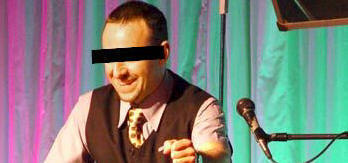 The
usual process for writing one of these Op-Ed pieces is that anyone writing
one of these sends a basic idea to Jules our Op-Ed-Editor so to speak.
If Jules gives the idea the nod, we then spend about two weeks hammering
it out into something vaguely coherent. This Op-Ed was originally supposed
to be a well researched and thought out piece on how copyright and recording
technology have changed modern music. Well nuts to that.
Read the full article... The
usual process for writing one of these Op-Ed pieces is that anyone writing
one of these sends a basic idea to Jules our Op-Ed-Editor so to speak.
If Jules gives the idea the nod, we then spend about two weeks hammering
it out into something vaguely coherent. This Op-Ed was originally supposed
to be a well researched and thought out piece on how copyright and recording
technology have changed modern music. Well nuts to that.
Read the full article...
|
|
Musicians and their role in Politics
|
Dateline: October 2004 |
|
 I
write from California. I spent my 20s in Los Angeles during the Reagan
Era, and it was hell. That administration was supporting death and torture
squads in El Salvador and Nicaragua, The environment was under attack.
Far Right nuts were being nominated to the Federal & Supreme Courts.
The national debt was being doubled and tripled (sounds like deja-vu
all over again, huh?). I remember feeling that it was the first time
in our history that the following generation would not have it better
than their parents. Read
the full article... I
write from California. I spent my 20s in Los Angeles during the Reagan
Era, and it was hell. That administration was supporting death and torture
squads in El Salvador and Nicaragua, The environment was under attack.
Far Right nuts were being nominated to the Federal & Supreme Courts.
The national debt was being doubled and tripled (sounds like deja-vu
all over again, huh?). I remember feeling that it was the first time
in our history that the following generation would not have it better
than their parents. Read
the full article...
|
|
Irish Music - a truly influential force?
|
Dateline: October 2004 |
|
Roddy Doyle said recently in an interview in The Guardian
that Ireland doesn't produce great musicians. Considering that he is
currently promoting a novel centred on Louis Armstrong and American
jazz, it's possible that he may have been quoted out of a very broad
context. Nonetheless, he has a valid point.
Read the full article...
|
 As
Michael Jackson's court case gets underway Aidan Curran reflects on the fact
that - whether he is found innocent or guilty - his fall from grace is a
personal tragedy on an enormous scale.
As
Michael Jackson's court case gets underway Aidan Curran reflects on the fact
that - whether he is found innocent or guilty - his fall from grace is a
personal tragedy on an enormous scale.![]() Check out the discussion this article provoked on the
CLUAS
discussion board.
Check out the discussion this article provoked on the
CLUAS
discussion board.












